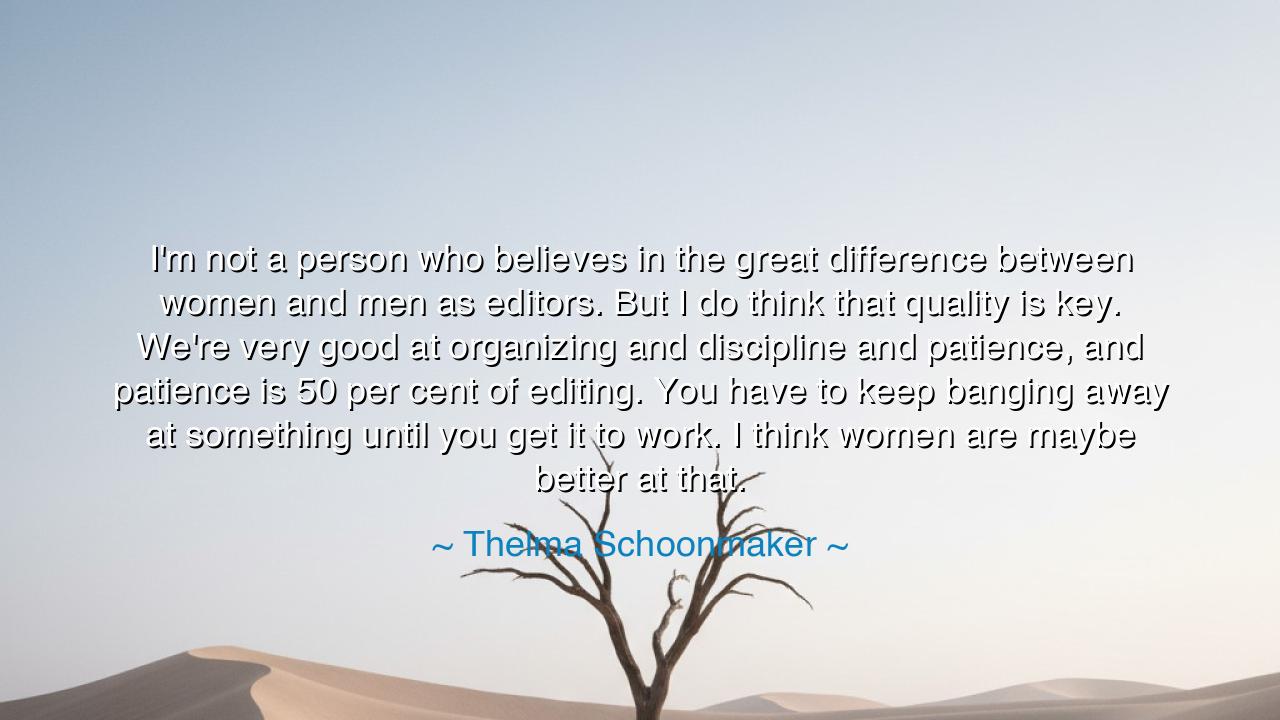
I'm not a person who believes in the great difference between
I'm not a person who believes in the great difference between women and men as editors. But I do think that quality is key. We're very good at organizing and discipline and patience, and patience is 50 per cent of editing. You have to keep banging away at something until you get it to work. I think women are maybe better at that.






Hear the words of Thelma Schoonmaker, master of the hidden art of cinema: “I’m not a person who believes in the great difference between women and men as editors. But I do think that quality is key. We’re very good at organizing and discipline and patience, and patience is 50 per cent of editing. You have to keep banging away at something until you get it to work. I think women are maybe better at that.” These words are not simply about film—they are about the deeper rhythm of creation itself. For she speaks of patience, of discipline, of the relentless hammering upon the stone of imperfection until it yields beauty.
The ancients understood this truth well. The sculptor, chiseling marble, did not bring forth the god in a single blow; he struck a thousand times, each strike guided by vision and endurance. The poet, composing verse, rewrote and reshaped until the lines sang as if born of heaven. The general, preparing for war, drilled his troops day after day, until instinct replaced hesitation. In all of these, patience was not weakness, but power—the quiet strength that bends time itself to human will. Schoonmaker’s craft of editing is but a modern mirror of this timeless principle.
She reminds us that the act of creation is less about sudden inspiration than about the persistence of effort. To “keep banging away at something” is to acknowledge that even genius is nothing without labor. Consider the cathedral builders of medieval Europe, who spent lifetimes raising spires that reached toward heaven. Many never saw the completion of their work, yet their patience ensured that their vision endured across centuries. In the same way, editors of film—or of any art—shape their work cut by cut, revision by revision, until the story breathes with life.
In her words also lies a recognition of discipline and organization. To create is not chaos, but order forged from chaos. The master craftsman arranges his tools; the wise leader orders his plans; the skilled editor aligns sound and image until they flow in harmony. And yet, behind this discipline beats the heart of patience, the willingness to endure frustration, to work when progress seems invisible, to believe that persistence will one day summon clarity.
Schoonmaker hints, too, at the strength often found in women—the ability to endure with grace, to work quietly, steadily, without seeking immediate reward. History is filled with such examples: women who sustained households, nurtured generations, and held communities together through the slow labor of daily care. This same endurance, when turned to art or leadership, becomes a formidable force. It is not a matter of superiority, but of a gift often overlooked—the power of patience to create lasting works.
The deeper meaning of her words is this: that greatness is not born in sudden bursts, but in long labor. Talent may give a spark, but patience feeds the flame until it becomes a fire. Those who lack it will abandon their work in frustration, leaving visions half-formed. Those who possess it will strike again and again, refining, shaping, enduring, until at last their creation stands complete. Patience, therefore, is not merely half of editing—it is half of all achievement.
The lesson for us, children of tomorrow, is clear: cultivate patience in all that you do. Do not be deceived by the glamour of quick success or the illusion of instant mastery. Learn instead to endure, to revise, to keep striking the stone until form emerges. Be disciplined, be organized, and never tire of “banging away” at the tasks that matter. For in persistence lies power, and in patience lies triumph.
Practical actions await you: when your work feels endless, remind yourself that each repetition is progress. When frustration tempts you to abandon the task, remember that even masterpieces are built in fragments. Practice discipline daily, however small, and honor the strength of patience within yourself and others. In this way, you will not only create, but endure, and your work will outlast the passing storms of time.
Thus, let Schoonmaker’s words echo as timeless teaching: the path to excellence is not a leap but a long march, carried forward by patience, discipline, and unyielding labor. Walk this path, and though your progress may seem slow, you will one day look back and see that you, too, have built something that endures.






AAdministratorAdministrator
Welcome, honored guests. Please leave a comment, we will respond soon